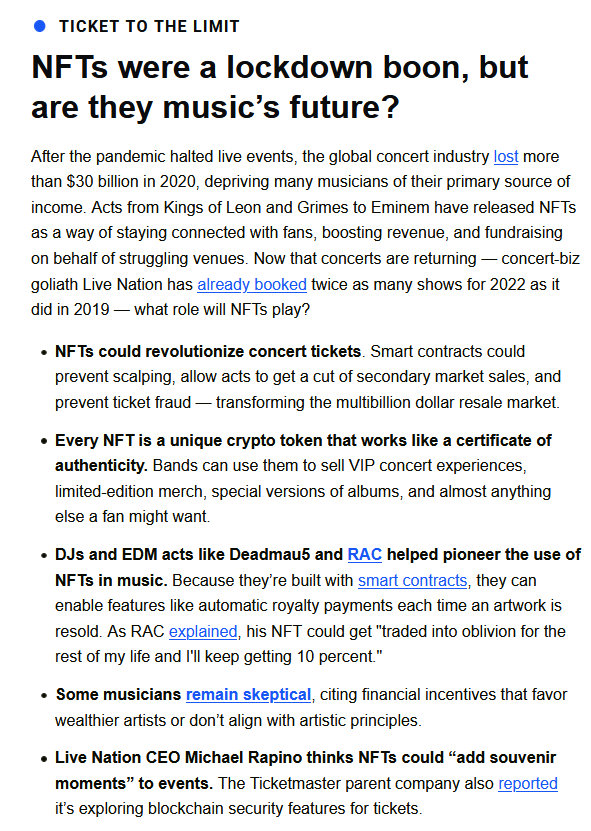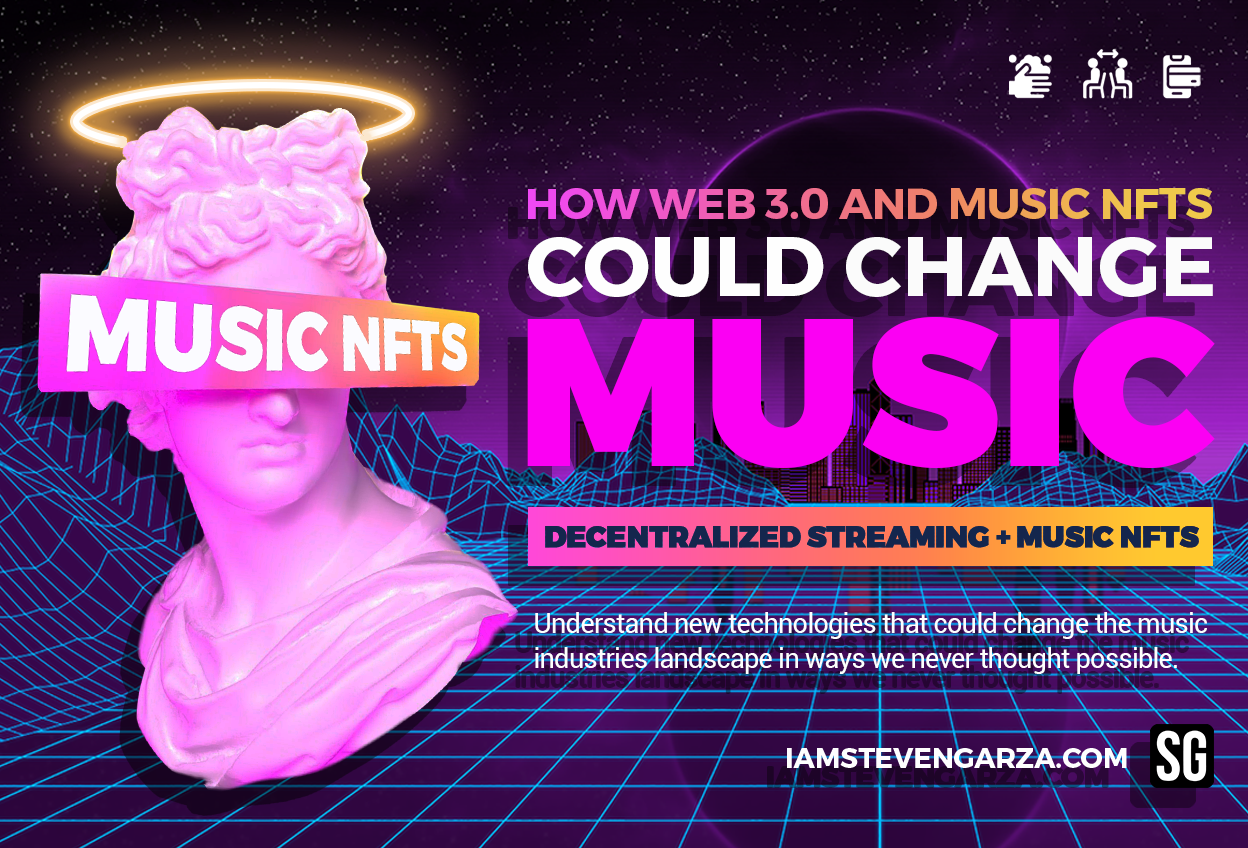NFTs have the potential to innovate royalty payments for musicians. The rise of non-fungible tokens (NFTs) has the potential to revolutionize the way musicians receive royalties.
NFTs are digital tokens that represent ownership of a unique asset or piece of content, such as a song or album. With the use of NFTs, musicians can receive a percentage of the sale each time their music is sold, rather than collecting traditional royalties.
This allows for a more direct relationship between the artist and the buyer, bypassing intermediaries like record labels and streaming services. Additionally, NFTs can provide a way for musicians to offer exclusive content and merchandise to their fans, creating new revenue streams. Despite some challenges and criticisms, NFTs could prove to be a promising new way for musicians to monetize their work in the digital era.
How Nfts Can Benefit Musicians
NFTs are changing the landscape for musicians seeking fair royalties and greater control of their creative outputs. These unique digital assets enable artists to monetize their music and connect directly with fans, creating new opportunities for revenue generation while providing greater transparency and security.
NFTs or Non-Fungible Tokens are making headlines because of their potential to revolutionize the art industry. Beyond just art, NFTs could also open new opportunities for musicians who have struggled for years with the traditional music industry. In this post, we will explore how NFTs can benefit musicians, cutting out middlemen, creating a direct relationship between artists and fans, providing proof of authenticity and ownership, and offering opportunities for additional revenue streams.
Cutting Out Middlemen
The music industry is packed with intermediaries who act as a go-between for artists and music fans. The middlemen include labels, distributors, and royalty collection agencies that take a considerable share of the revenue generated. However, with NFTs, musicians can create and release their work directly to their audience without interference. By using blockchain technology, NFTs can enable musicians to sell their music directly to their fans, reducing the costs and complexities of the music industry.
Direct Relationship Between Artist And Fan
With NFTs, musicians can build a closer relationship with their fans by creating unique and personalized experiences. Fans can purchase NFTs that unlock exclusive content, experiences or allow them to own a piece of the artist’s work. NFTs can help to eliminate the barrier between artist and fan, creating a direct line of communication, and providing artists with the opportunity to better understand their fans’ preferences. The direct interaction allows for better feedback, loyalty, and insights, creating a win-win situation.
Proof Of Authenticity And Ownership
Musicians can benefit from NFTs in establishing proof of ownership and authenticity for their music. The smart contracts on the blockchain technology used in NFTs are unique to each piece of art, including music tracks. Each NFT is a digital certificate of ownership that cannot be replicated, and the blockchain technology ensures that the each verified copy is the original. Therefore, musicians can have the assurance that their work is not only authenticated but also traceable, which is essential in protecting their intellectual property rights.
Opportunities For Additional Revenue Streams
In the traditional music industry, the major revenue stream for musicians comes from the sales of their music. However, with NFTs, musicians can open doors for additional revenue streams. The exclusive, personalized, and unique experiences that come with owning NFTs can fetch a high value. Additionally, NFTs can help in promoting and selling merchandise, concert tickets, and other fan experiences. The potential to tap into new markets with NFTs is enormous, and musicians can earn more by branching out into other areas beyond sales of their music. Overall, NFTs have the potential to disrupt the traditional music industry by empowering musicians with more control over their work and the ability to forge a closer relationship with their fans. With NFTs, musicians can be more creative, experimental, and innovative while enjoying greater rewards from their work.

Credit: twitter.com
Concerns Surrounding Nfts In The Music Industry
Non-fungible tokens (NFTs) present a unique opportunity for musicians to take control of their own careers and earn more for their work. However, the music industry has raised concerns about the implications of this new technology.
Accessibility And Inclusivity
One of the main concerns surrounding NFTs in the music industry is accessibility and inclusivity. While NFTs have the potential to provide a new revenue stream for musicians, it’s important to consider whether all fans will have access to this technology.
- How can we ensure that fans with limited technical knowledge can participate in buying and selling NFTs?
- What about fans who don’t have the financial means to purchase NFTs?
These are important questions that need to be addressed to ensure that NFTs do not create new barriers for music fans.
Environmental Impact
Another concern is the environmental impact of NFTs. The process of minting an NFT requires a significant amount of energy, which contributes to carbon emissions and exacerbates climate change.
| NFT Minting | Environmental Impact |
|---|---|
| High energy consumption | Increased carbon emissions |
| Requires specialized hardware | Contributes to e-waste |
It’s important for the music industry to consider the environmental impact of NFTs and explore ways to minimize their carbon footprint.
Lack Of Standards And Regulations
Finally, there is a lack of standards and regulations surrounding NFTs in the music industry. Without clear guidelines, there is a risk of fraud, copyright infringement, and other legal issues.
- How can we ensure that NFTs are authentic and not counterfeit?
- What protections are in place to prevent artists from being exploited?
These are critical questions that need to be addressed by the music industry and regulatory bodies to ensure that NFTs provide a fair and transparent marketplace for all parties involved.
Examples Of Musicians Who Have Benefited From Nfts
Musicians have started to benefit from NFTs, with examples including 3LAU’s album sale earning over $11 million. Kings of Leon’s album became the first-ever NFT album sale, while DJ Premier sold exclusive beat NFTs. NFTs could be a game-changer for royalties in the music industry.
Examples of Musicians Who Have Benefited from NFTs NFTs or Non-Fungible Tokens are digital assets that offer ownership rights over unique pieces of digital content. Musicians can use NFTs to sell unique audio tracks, albums, and merchandise, allowing them to monetize their work without involving intermediaries. NFTs can revolutionize royalties for musicians, bringing in more revenue streams and rewarding creators for their hard work, creativity, and innovation. Grimes Grimes, the Canadian musician, sold $6 million worth of digital art as NFTs, including exclusive music and visual art pieces. She sold 10 different versions of her digital works, with each token representing ownership of one piece. This allows her to monetize her art in a way that was not possible before, bypassing traditional intermediaries and earning more money for her unique creations. Kings of Leon Kings of Leon, the American rock band, became the first band to release an album as an NFT. The band released a limited edition of their latest album, titled “When You See Yourself,” as three distinct NFT packages. These packages contained unique digital art, live show perks, and audiovisual art pieces in addition to exclusive music. Fans could purchase these packages using cryptocurrency and own a piece of the band’s history. Steve Aoki Steve Aoki, the DJ and producer, auctioned his first-ever NFT collection to benefit his Aoki Foundation. The collection included unique pieces of digital art, including unreleased music tracks and audiovisual art pieces. The winning bidder also received a real-life experience, such as a private DJ lesson, dinner with Aoki, or a trip to one of his shows. The auction raised over $4 million, with the proceeds going towards supporting brain science research and regenerative medicine. In conclusion, NFTs can revolutionize the way musicians monetize their work, offering new revenue streams and ownership rights over unique digital content. Grimes, Kings of Leon, and Steve Aoki are just some of the musicians who have benefited from NFTs. As more musicians adopt this technology, we can expect to see a shift in the music industry, empowering creators to take control of their art and earn more money from it.

Credit: iamstevengarza.com
Frequently Asked Questions For How Nfts Could Revolutionize Royalties For Musicians
What Are Nfts And Why Are They Important For Musicians?
NFTs or non-fungible tokens are unique digital assets that cannot be replicated. Musicians can use them to sell music, art, and merchandise directly to fans without intermediaries. This approach offers more control over earnings, copyright, and royalties.
How Can Nfts Improve The Royalty System For Musicians?
Traditionally, musicians rely on streaming services and record labels to earn royalties, which often takes time and money. With NFTs, musicians can sell their music directly to fans and receive payment instantly. NFTs can also provide more transparency in revenue sharing and reduce the risk of piracy.
What Are The Challenges That Musicians Face With Nfts?
One of the main challenges musicians face with NFTs is the lack of education and understanding of how they work. Another challenge is the high energy consumption associated with the creation and sale of NFTs. Musicians also need to find a reliable and secure platform to sell their NFTs and ensure their fans are interested in buying them.
Conclusion
With NFTs, the music industry has realized the potential of blockchain technology to protect the digital rights of musicians, ensure they receive rightful compensation, and provide fans with a new way to engage with and invest in their favorite artists’ music.
This revolutionary technology could level the playing field for all musicians, especially those who struggle to navigate a complex industry. As NFTs continue to gain traction and evolve, it will be exciting to see how this innovation influences not only music, but also other areas of the entertainment industry and beyond.